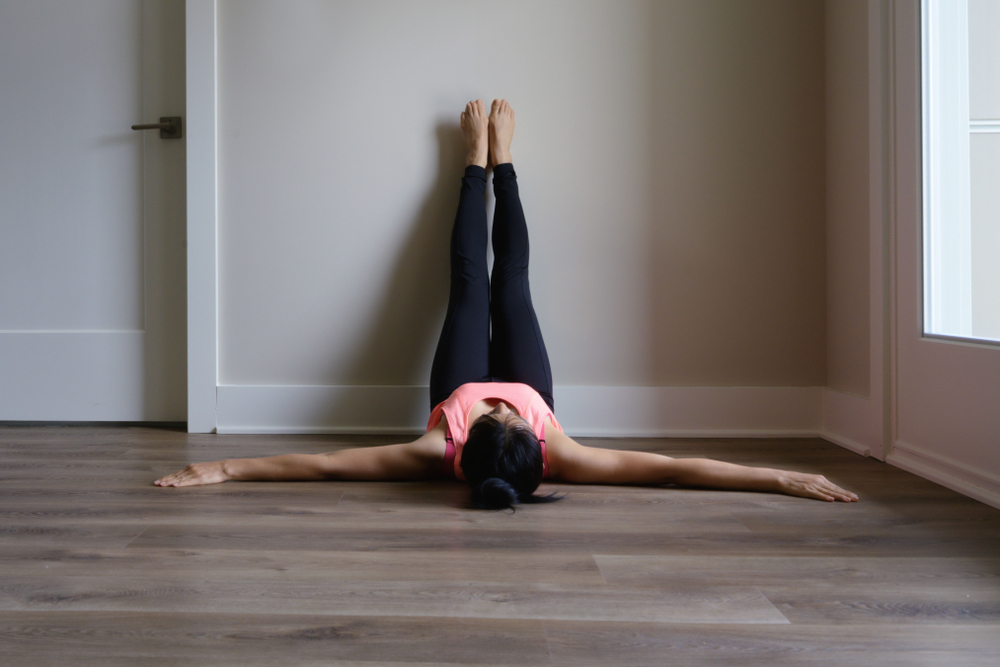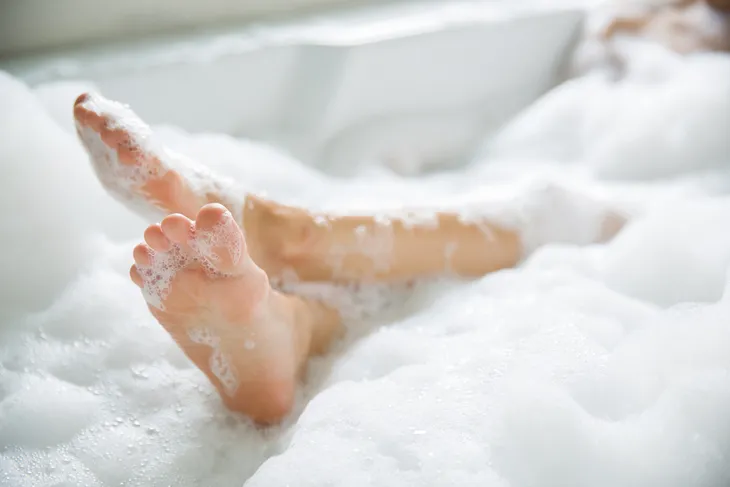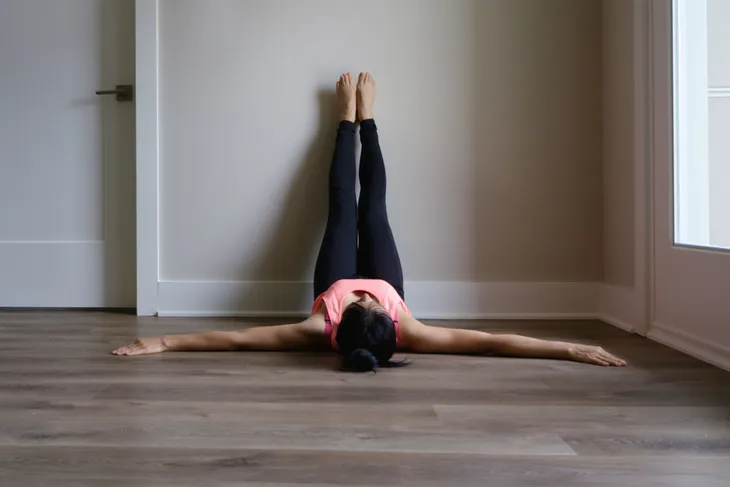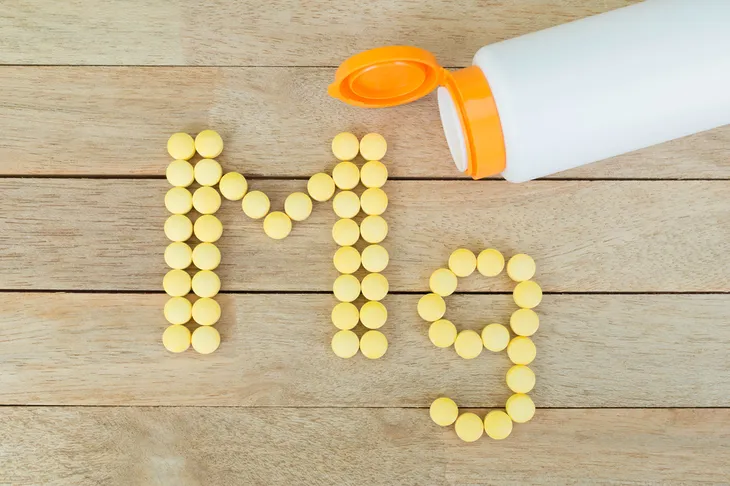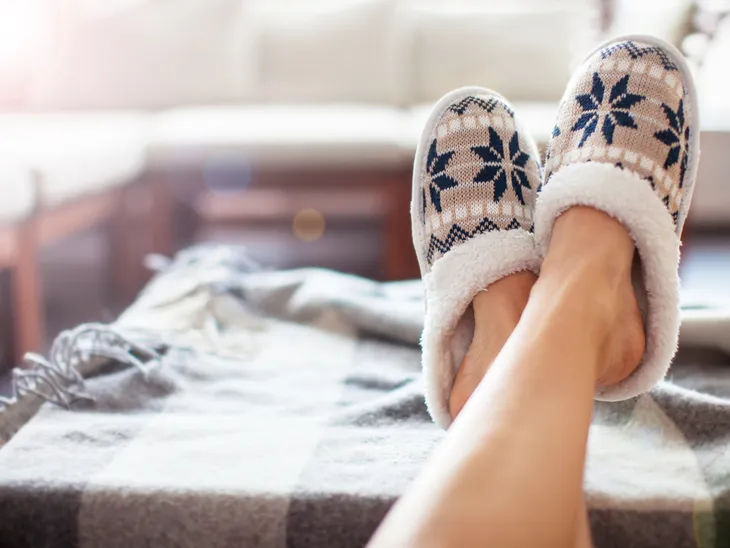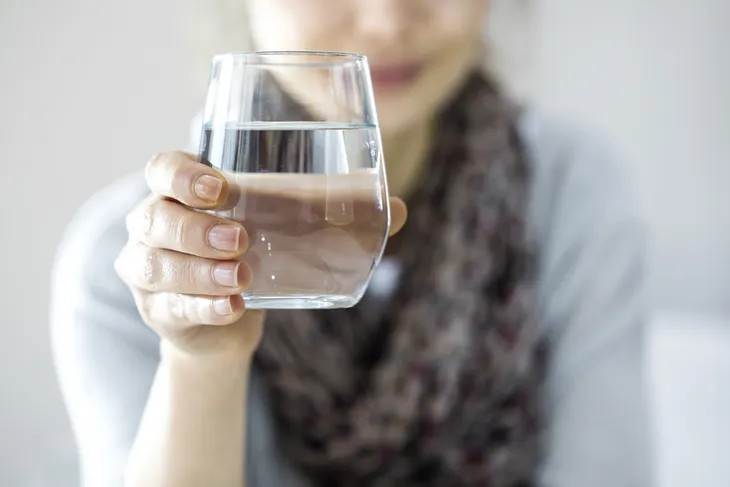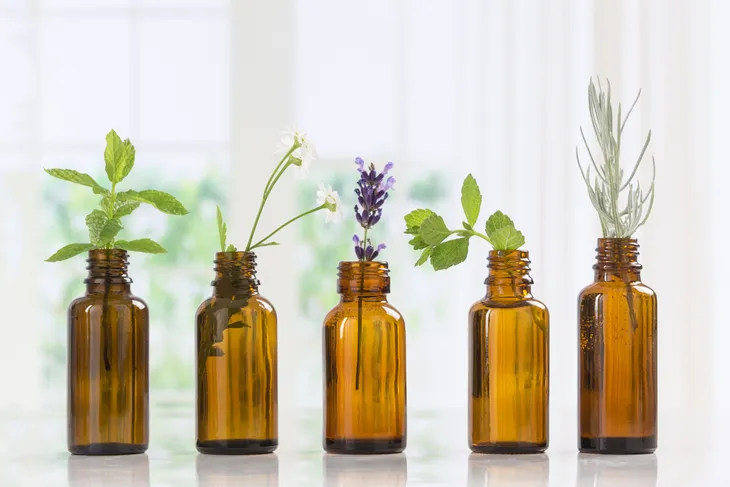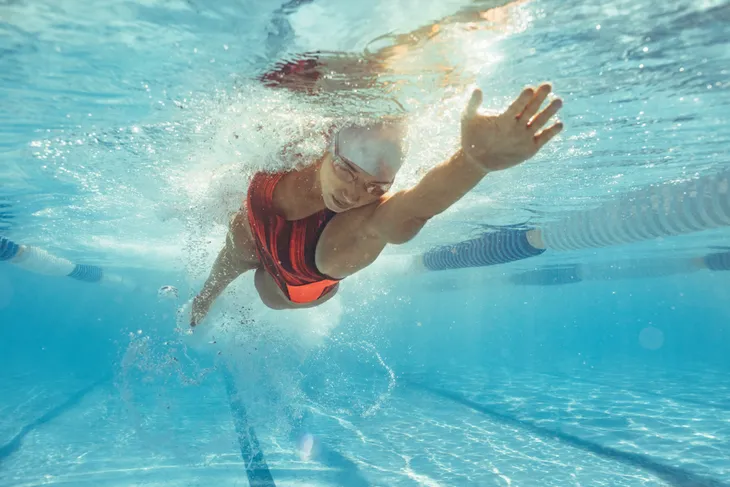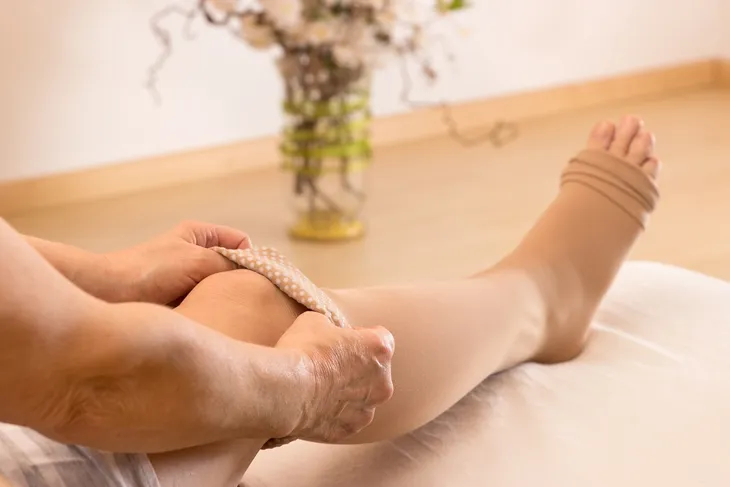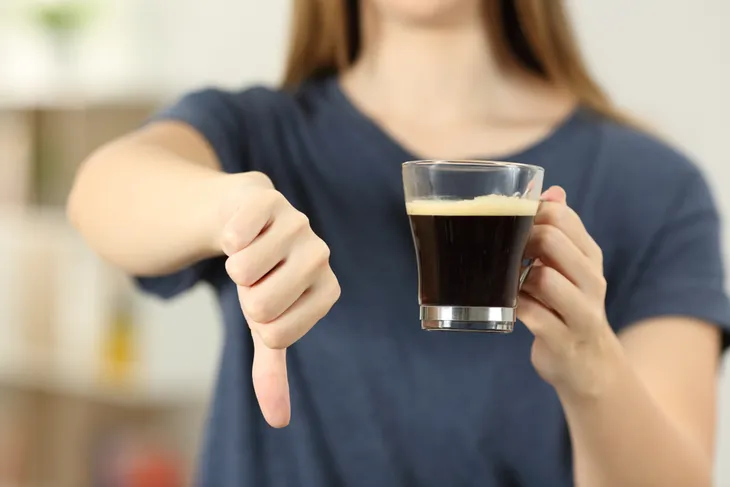Thanks to our feet, we’re able to get to some pretty cool places. However, when the humidity sets in, if you’re pregnant, or if you carry around a bit of excess weight, you might be the victim of swollen feet and ankles on a regular basis.
Luckily, along with resting your tender tootsies, there are plenty of effective home remedies to treat painful swollen feet at home so you can get back out and enjoy the world…
Epsom Salt Soak
Epsom salts work magic on painfully swollen feet. There are a lot of reasons feet can swell and the accompanying pain can cause a lot of discomfort. Dissolving a few cups in your bathwater will do the trick on fatigued tootsies, calves, and ankles. If you don’t want to waste water on a full bath, you can always prepare an Epsom salt foot bath in a shallow bucket of water. Soak your feet for at least 15-20 minutes, longer if you have the time.
Some health professionals recommend using Epsom salts for swelling, but also for feet that are injured or infected (avoid using on open sores), and even for arthritis. These salts are quite low in price with potentially great benefits for overall foot health. Epsom salts are made of magnesium sulfate that is absorbed through the skin – the reason why these salts are so successful at reducing swelling and improving blood circulation. An added bonus? They’ll also make and keep your feet smelling good for longer and soothe dry skin.
Yoga
Gentle exercises such as yoga postures can do much to encourage blood circulation, which will stop blood from pooling in certain areas like the feet and ankles. Many poses to help with swelling involve flexing and extending your toes and feet. By stretching the muscles in your lower legs and feet, you can improve circulation. Yoga inversion postures that elevate the feet above the heart – such as lying on your back and putting your legs straight up against a wall – can also alleviate pressure and swelling on fatigued lower extremities.
Yoga is a common remedy for edema, a medical condition that causes feet and legs to retain fluid, resulting in uncomfortable swelling. Pregnant women are especially susceptible to this condition, which can add to the already-present discomfort of carrying a child. If you want to try home remedies like yoga for swollen feet, it’s best to talk to your doctor beforehand, as well as take a yoga class to learn how to do the poses properly.
Magnesium Supplements
If you suffer from painful swollen feet, ankles and calves regularly, you may want to ask your health care provider if magnesium supplements might relieve pain. Oftentimes, a magnesium deficiency can contribute to inflammation of the feet or even cause edema, which causes you to retain fluid in your feet and legs. Even if you don’t have a magnesium deficiency, supplements might still be a good remedy because extra magnesium has been known to help. On top of many pregnant women developing edema, women in general can be more susceptible to swollen feet each month before their menstrual cycle, the time when a woman’s body naturally retains more water.
Speak with your doctor before taking any supplements because magnesium and some other supplements known to reduce swelling can interact with other medications, making the swelling worse. And people with heart or kidney disease should not take magnesium supplements, as there’s an increased risk of complications.
Elevate Your Tootsies
Inverted gravity can be a great ally to swollen feet and ankles. Try propping up your lower legs in bed using a pillow so that your feet are elevated above your heart and encourage fluid to drain away, and be absorbed, or eliminated (via urination) by the body. You’ll likely have to do this several times a day, depending on how severe your condition is.
Inversion tables are also a good way to elevate your feet and decrease swelling. Lying on your back, these tables lock in your feet and then allow you to pretty much hang upside down. This remedy for swollen feet doesn’t work for everyone, but it’s a good one to try. And inversion tables are known to help with many back problems and alleviate back pain, so you may help treat another area of your body at the same time you reduce the swelling in your feet.
Foot Massage
A foot massage is one of the best remedies for swollen feet and ankles. When you are on your feet all day long, blood flow is often restricted, causing fluid to pool in the feet. This can also happen even from sitting for long periods of time. However, regular massage to the area can help encourage better blood flow in the lower extremities. In general, foot massages are also a good way to relax after a long day.
You don’t have to fork out money to get a professional massage, though that’s obviously an option. It can be easy to learn how to give a massage, so your partner or friend could help you out. For many people, only light massaging is needed to reduce the swelling. The massage should start at your feet and move up to your knees to help improve circulation. For even better results, use an oil that will aid in reducing the swelling or discomfort, such as cypress or camomile oil.
Hydrate
A significant amount of people don’t drink enough water every day, contributing to swelling. When your body doesn’t get the water it needs, it begins to retain water in an attempt to avoid dehydration, leading the retained water to cause swelling in the feet and legs. Oftentimes, just drinking more water throughout the day will help dilute sodium and caffeine, main contributors to lower inflammation. Drinking 8 to 10 glasses of water per day will help flush toxins out of the body.
Swollen feet can cause pain and discomfort, it can be difficult to get your feet in shoes, or even make you unable to walk far or drive if the swelling is severe. To maximize the benefits of drinking more water to help reduce swelling, try adding a few slices of lemon to your water for the added anti-inflammatory benefits. For some people, simply hydrating can alleviate their symptoms, while others may have to use a combination of remedies. But regardless of whether it helps with your swollen feet, you should still make sure you drink enough water regularly.
Essential Oils
Essential oils are derived from herbs and offer a holistic approach to reduce swelling. Adding anti-inflammatory essential oils—such as peppermint, eucalyptus, lemon, or lavender—to your massage oil or bathwater will do much to relieve the pain and swelling in your feet and ankles. Chamomile and lavender work as an anti-inflammatory, eucalyptus reduces swelling and is effective for relieving pain, and peppermint oil can help cool your feet, giving you soothing relief. A lot of oils offer other health benefits too, and the scent can be calming. You can either massage essential oils into the affected area or use them in a foot soak.
If your swelling is painful or if you experience swelling often and with other symptoms, you should go to your doctor. There are a lot of medical conditions that can cause swelling, so it’s important to make sure you don’t have an underlying condition that’s causing your feet, ankle, or legs to swell. Your doctor will also be able to suggest other ways to reduce swelling, depending on what they deem the cause may be.
Swimming
When you take a swim you are buoyant. It’s one of the few activities that don’t demand anything from our lower extremities. Taking the impact and weight off of your feet, ankles, and calves during a 30-minute swim each day can lessen swelling and relieve inflammation pain. The cool temperature of the water can give you additional relief, and your circulation will improve, removing the excess blood that’s pooled in your feet.
You can even benefit from simply standing in water up to your neck if you’re unable to swim. If you’re pregnant and have swollen feet and ankles, swimming can also take the stress off your back and hips, alleviating pain from the extra weight. Not to mention swimming is an extremely good form of exercise because of how many muscles are used all over your body, so it can be an effective way to stay in shape. Try out an aerobic swimming class if laps aren’t your style.
Support Hose
If you suffer from severe inflammation of the feet, calves, and ankles, your doctor may recommend using support or compression hose or stockings to prevent swelling and take some of the pressure off of your lower extremities. These may also help prevent blood from pooling and causing painful varicose veins from forming, a common result of chronic swelling. When your feet and ankles swell from blood pooling, the support hose makes the blood move more quickly, increasing circulation and getting the blood to move up your leg instead of centering around the feet.
Compression hose are a preventative remedy for swollen feet and lower legs, but they can also help relieve the pain and discomfort when they swell. Some people wear them regularly, especially if they sit or stand for long periods of time. With how popular and effective support hose are, there are many lightweight options available for optimal comfort.
Avoid Salt and Caffeine
Salt and caffeine are common causes of foot swelling, and reducing your sodium and caffeine intake can do much to alleviate fluid from forming in your ankles and feet. Both salt and caffeine are bad news when it comes to fluid retention, so try finding alternative sources of salt (i.e., dried seaweed or sea salt) and lowering your caffeine intake to relieve foot swelling. Instead of going for that second cup of coffee, switch to water, another known remedy for swollen feet.
Salt causes your body to retain water, which can lead to swelling. Stick to low-sodium and fresh food to help reduce your salt intake. A lot of processed and frozen foods are packed full of salt – avoid these as much as possible and read nutrition labels to see the amount of sodium in the product. Excessive salt can also be really bad for your blood pressure and lead to hypertension. Heart disease is serious, so cutting back on the salt can be really good for your heart health.
